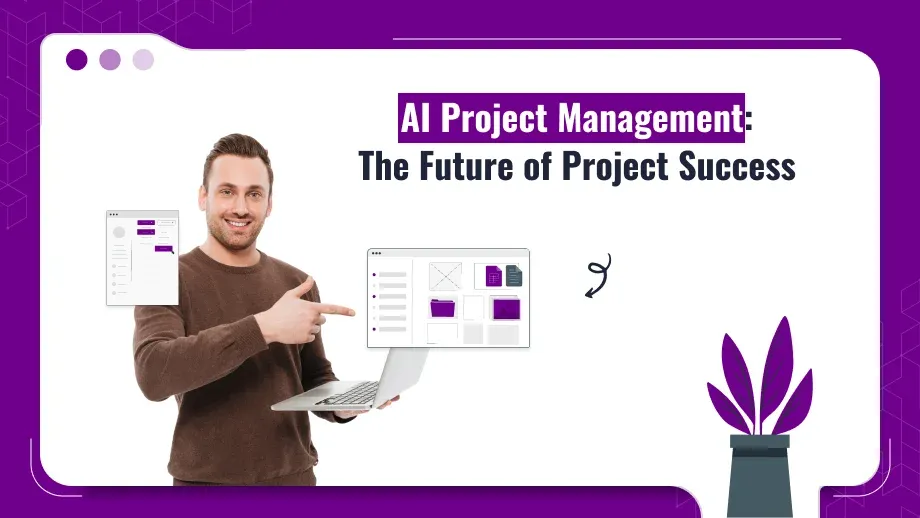
In today’s competitive business world every project or program is more dependent upon the utilization of modern techniques and technology. A major and revolutionary innovation of the past few times has been the implementation of AI to manage projects. From reducing routine tasks to maximizing resource allocation and forecasting potential risks, AI for project management is conducted. If integrated properly, AI empowers project managers to take data-driven decision making, improve workflows, reduce time-to-market, and boost the quality of project results.
This comprehensive guide covers the basics of what AI project management is, why it matters, and the most important AI tools to be used in managing projects as well as common obstacles to deployment and effective practices to ensure effective integration of AI. Upon reading this guide, you will be able to apply the power of AI for improved performance and effectiveness in your projects.
What is AI Project Management?
AI project management is that artificial intelligence technology, for example, machine learning, natural language processing, as well as predictive analytics may be used to aid activities of AI project management in numerous ways. Analyzing the historical data to find some patterns and making real-time recommendations, AI helps project managers enhance their decision-making power and increase productivity.
AI-powered tools are able to assist in many projects, such as:
- Automating repetitive tasks such as the scheduling of appointments, data entry and even reporting.
- Analyzing project results to determine the best outcome by looking at risks and trends.
- Enhancing communication with chatbots through natural language processing software.
- Optimizing allocation of resources by determining the most efficient distribution of resources in order to achieve maximum efficiency.
In the end, the aim of AI in managing projects is to enhance the efficiency of AI project management, decrease errors made by humans, and permit an AI Project Manager to concentrate on strategic planning and management.
Why is AI Project Management Important?
The incorporation of AI project management practices has several benefits.
Enhancing Efficiency and Productivity
AI is able to automate tedious administrative tasks such as organizing meetings, updating timelines of projects as well as generating Progress reports. In freeing project managers of these tedious tasks, AI allows them to be more productive improving overall productivity.
In particular the scheduling software that is powered by AI can instantly determine and recommend optimal timings for meetings based on participants’ availability, which can save hours of hand-coordination. Similar to that, the reporting tools fueled by AI will be able to collate data and create reports in just a few clicks, thus reducing administration workload.
Supporting Project Scope Management
Achieving effective Project Scope Management is crucial for maintaining a project’s progress and in line with its goals. AI helps by making sure that changes in scope are documented as well as ensuring that the stakeholders are aware of changes and that all impact is recorded. This type of oversight is crucial for complex projects that require scope adjustments to be carefully managed to avoid delay in the project or overruns on budget.
Improved Decision-Making with Data Analytics
By analyzing vast volumes of data and offering insightful analysis, AI aids in decision-making. By using predictive analysis, AI tools can assess the historical data of projects and find trends that might indicate delay or risks. This approach is proactive and allows project managers to take data-driven decision-making and prepare for eventualities.
In particular, AI can predict resource problems by studying the time taken to complete tasks across similar projects in the past, allowing managers to alter plans and reduce delay. With these data managers are able to improve the project’s outcomes as well as reduce risk, particularly in large projects, where accurate forecasting is vital.
Launch Success – Embrace AI Project Management!
Streamline decisions and workflows for smarter, faster project outcomes from the start.
Aligning with Project Objectives
AI instruments play an important function in helping teams achieve the specific Project Objectives by automating tracking and reporting on status. AI will provide immediate insights about progress, allowing managers to immediately spot any divergence from the goals. With its focus on the objectives all through the duration of the project, AI ensures that all efforts are directed towards achieving the original objectives of the project.
Streamlining Communication
AI-powered tools, like virtual assistants and chatbots improve communication through rapid responses to questions and providing real-time updates on projects. Natural language processing tools can also allow chatbots and answer questions from stakeholders making sure that all data is available to everyone on the team, regardless of location or time zone.
In hybrid and remote work situations, AI project manager assistants can be particularly beneficial in ensuring that the project’s information is seamlessly transferred across the teams. Chatbots are able to answer queries about progress of the project, send information on the task’s completion as well as send reminders about the upcoming deadlines. This keeps everyone on track and informed.
Key AI Techniques and Tools in Project Management
The introduction of AI into the management of projects relies on a variety of core methods and tools that are designed to simplify processes, improve communication and increase the capabilities of forecasting. Five essential AI techniques that are used in the field of managing projects:
1. Predictive Analytics for Project Forecasting
Predictive analytics utilizes historical data to anticipate the project’s timelines, needs for resources and risks that could be a possibility. Through analyzing past project results, AI algorithms can provide more precise timelines and forecast the project’s milestones more precisely. This is particularly beneficial when dealing with high-risk projects that require time-bound deadlines.
In particular, predictive analytics will help predict potential delays by looking at factors like collaboration efficiency and dependencies from external sources which allows project managers to make preventative measures to ensure that they stay on the right course.
2. Planning Tools and Techniques for Better Management
AI-driven planning tools and techniques help project managers simplify the planning process. AI is able to automate the allocation of resources as well as keep track of progress against baselines and reveal resource insufficiencies. Making use of these tools will ensure that each phase of a project can be completed as scheduled with minimal disruptions, and maximize efficiency.
3. Machine Learning for Resource Optimization
Machine learning algorithms are able to examine large quantities of data to identify an optimal way to distribute resources. In identifying bottlenecks and trends regarding the allocation of resources, AI helps project managers allocate resources with greater efficiency. This method reduces the amount of time spent idle, decreases expenses and increases efficiency by making sure that the appropriate resources are readily available at any time.
In this way, AI can suggest task assignments based on the teams’ workloads as well as abilities, while optimizing performance by balancing resources without putting too much pressure on any one.
4. Automation Tools for Routine Tasks
Automation is the main feature of AI project management. AI project management tools can perform repetitive tasks, such as creating project timelines, updating them with new information, reports and providing reminders to project deadlines. It reduces the administrative burden which allows managers of projects to concentrate on making strategic decisions and solving problems.
As an example Automated task assigning tools allow teams to assign tasks to members in accordance with the availability of each member and their project requirements making sure that no task get lost in the shuffle.
5. Sentiment Analysis for Stakeholder Feedback
Sentiment analysis can help project managers to understand the mood and tone behind feedback from stakeholders by studying the patterns of communication, like meetings and emails. When they can identify the stakeholder’s level of satisfaction and/or concerns the project manager can resolve concerns quickly and ensure the best possible relationships with stakeholders and ensure that projects are aligned.
As an example, sentiment analysis could reveal when an important stakeholder’s opinion is becoming more important, which indicates possible issues that must be addressed prior to them escalating.
Challenges in Implementing AI Project Management
Although AI can provide a lot of advantages, the implementation of AI project management poses many challenges.
Data Privacy and Security
AI is a hugely dependent system on data, and frequently requires access to information that is sensitive about projects, employees as well as stakeholders. Privacy and high security standards are crucial for the implementation of AI. Businesses must establish robust security procedures to safeguard their information from data breaches as well as be sure to comply with all rules and regulations.
High Implementation Costs
The implementation of AI solutions for managing projects is costly, particularly for small-sized companies. Installation costs, cost of software and training are all requiring the investment. But once it is installed, AI can lead to reductions in costs by enhancing the efficiency of projects and decreasing risks.
Best Practices for Implementing AI Project Management
In order to successfully incorporate AI project management process take a look at these recommended techniques:
1. Begin with Pilot Projects
Before you deploy AI throughout all projects, first start by implementing pilot projects to evaluate AI capabilities, and assess the effectiveness of AI. The piloting process allows companies to spot problems, alter parameters, and determine the effect on projects prior to rolling out a wider deployment.
2. Use the Best Project Management Software
The best Project Management software with integrated AI capabilities will simplify workflows, streamline mundane tasks, and give useful analysis. Making sure you choose reliable software is crucial to maximize AI’s capabilities in managing complicated projects effectively.
3. Use AI to Complement Human Skills
AI excels in performing repetitive tasks as well as analyzing huge amounts of data, however it isn’t equipped with the critical thinking of humans. It is important to encourage project managers to employ AI as an aid using its strengths, while using human-based insights in nuanced or complicated circumstances.
Conclusion
The introduction of AI to manage projects transforms the way projects are designed, implemented and managed. Automating repetitive processes, providing data-driven insight and improving communication AI allows project managers to manage projects with more efficiency and accuracy. A few of the best AI projects over the last few years have proven the effectiveness of AI in identifying risk as well as optimizing resources and improving decision-making. This makes AI an indispensable asset to contemporary project teams.
Implementing AI in the management of projects will not just improve the quality of projects but also improves the efficiency of teams and satisfaction of stakeholders. Teams that manage payroll software HR or projects in HR departments, AI offers insights that streamline workflows and help automate data-intensive processes, including paying taxes and payroll administration.
The business landscape is constantly changing, those who are able to develop AI skills and take advantage of this new technology will be in a good position to be successful in the coming years. Tools such as Superworks offer project teams complete tools that combine AI capabilities. This allows companies to remain competitive in a constantly changing and changing world.









